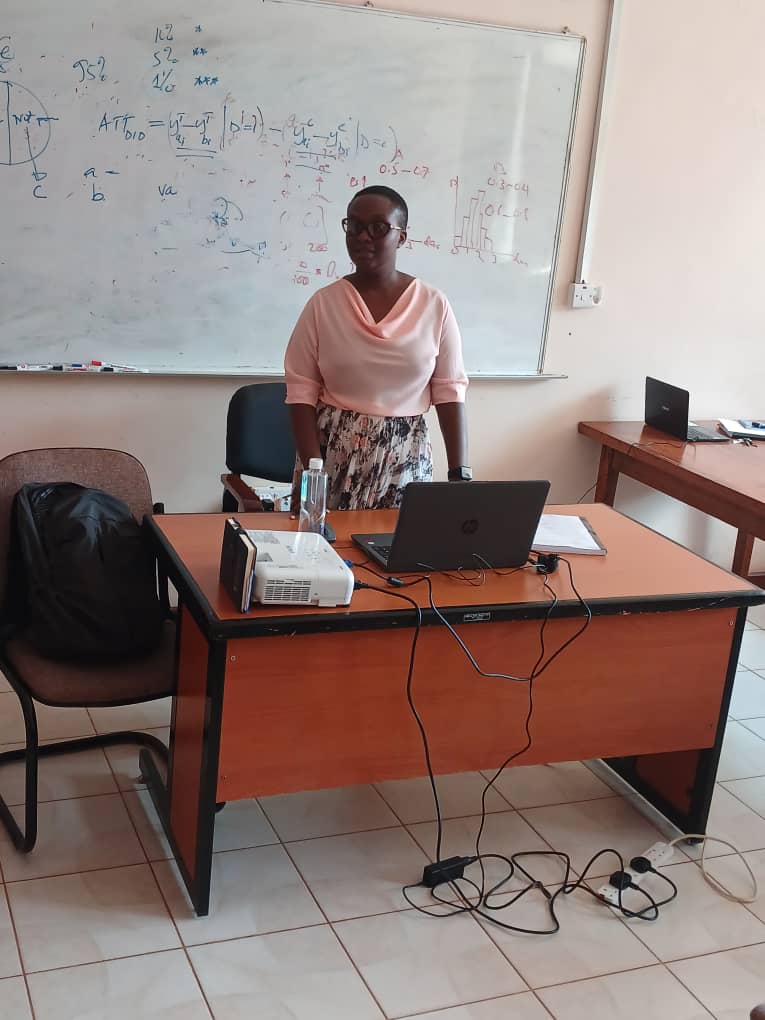 The Department would like to congratulate JACQUILINE MANDEYE NDOSSI for defending her PhD thesis. The title of the thesis is, “CONTRIBUTION OF VALUE CHAIN PROGRAMMES TO WOMEN SOCIO-ECONOMIC EMPOWERMENT: A CASE OF THE CAVA PROJECT, MARA REGION, TANZANIA.”
The Department would like to congratulate JACQUILINE MANDEYE NDOSSI for defending her PhD thesis. The title of the thesis is, “CONTRIBUTION OF VALUE CHAIN PROGRAMMES TO WOMEN SOCIO-ECONOMIC EMPOWERMENT: A CASE OF THE CAVA PROJECT, MARA REGION, TANZANIA.”
The abstract of the thesis is as follows:
This study critically analyzed the contribution of value chain programmes toward empowering women socially and economically in Mara region Tanzania. In particular, the study analyzed the contribution of the CAVA II project toward empowering women smallholder farmers who produce cassava for commercial and consumption purposes. To answer the main research question which asked about the contribution of the value chain toward empowering women smallholder farmers, the study addressed three specific objectives namely (i) to analyze the roles and activities of women’s participation in the cassava value chain before and after the project; (ii) to examine intra-household decision making on production and income generation options among smallholder women farmers in the cassava value chain in Mara region and (iii) to determine the contribution of value chain approach on empowering women to participate in agricultural enterprises in Mara region Tanzania. The study was conducted in three districts which were Royra, Bunda and Serengeti in Mara region Tanzania. The study adopted a cross-sectional research design, which was appropriate in allowing observation of variables whether group or individual to be done at a single time. Additionally, since the study aimed at investigating the impact of value chain intervention by the CAVA II project on women’s empowerment, the design was useful in investigating the impact of a certain intervention on women’s empowerment. Both qualitative and quantitative data were collected, whereby qualitative data were collected using Focus Group Discussions (FGDs) and Key Informant Interviews (KIIs) and quantitative data were collected using questionnaires. Quantitative data were analyzed using Wilcoxon signed-rank test, Human Development Index -and chi-square test and qualitative data were analyzed using content analysis. The findings showed that women’s participation in various roles and activities altered as the value chain progressed. For instance, women’s participation in roles and activities related to production increased. However, after the advent of new and improved equipment such as processing machines, the participation of women in processing activities decreased. The engagement of women in marketing activities remained low, especially for distance marketing, therefore there was little change. It is recommended that government and development partner programs create and execute the project that would improve women’s empowerment in high profitable nodes such as processing and marketing and, as a result, increase their involvement in roles and activities. This would boost livelihoods and reduce poverty among Tanzanian farming communities. The findings revealed further that women who participated in the cassava value chain intervention project were classified as having a high level of empowerment, as opposed to those who did not and were classified as having a low level of empowerment. These results imply that the CAVA II project’s agricultural training exposed women to new, better and updated cassava cultivation techniques. The results also demonstrate that women with five or more acres of land under cassava cultivation were classified as high level since they had more acres and had also gotten instruction from the project that led to high cassava yields. The results also demonstrate a relationship between age and the level of women’s empowerment, with women aged between 35 and 55 defined as highly empowered based on their age. This indicates that in a patriarchal society, women of this age – whether married or otherwise – were regarded as capable of making decisions. In contrast, decisions affecting productivity and income in the home were not permitted for women and girls between the ages of 15 and 34. The study also found a strong correlation between wage and farm work activities and the level of women’s empowerment. The study also discovered a strong link between income and farm work activities and the level of women’s empowerment. According to the findings, women who were both working and farming were classified as highly empowered as women who only kept livestock. Therefore, it can be argued that programs aimed at empowering women in agricultural production can have an impact on women’s decisions about what to produce and how to use the resources needed for those activities. Therefore, it is recommended that the Government and Development Partners’ programs plan and implement projects that would improve women’s empowerment and thereby increase their involvement in household decision-making. This would boost livelihoods and reduce poverty in Tanzanian farming communities. Findings indicate that following the program, women now had access to and control over all agricultural producing resources. This enabled women to autonomously manage agricultural production of all crops and significantly increase productivity. The study’s ultimate finding is that value chain interventions have the potential of increasing women’s participation in agricultural activities by giving them access to and control over productive resources. The study offers a long-term plan for guaranteeing women smallholder farmers access to and control over productive resources. It is therefore advised for governments and other actors to empower women to manage their agricultural tasks independently; this will to a large extent lessen gender-based violence and poverty among women.
